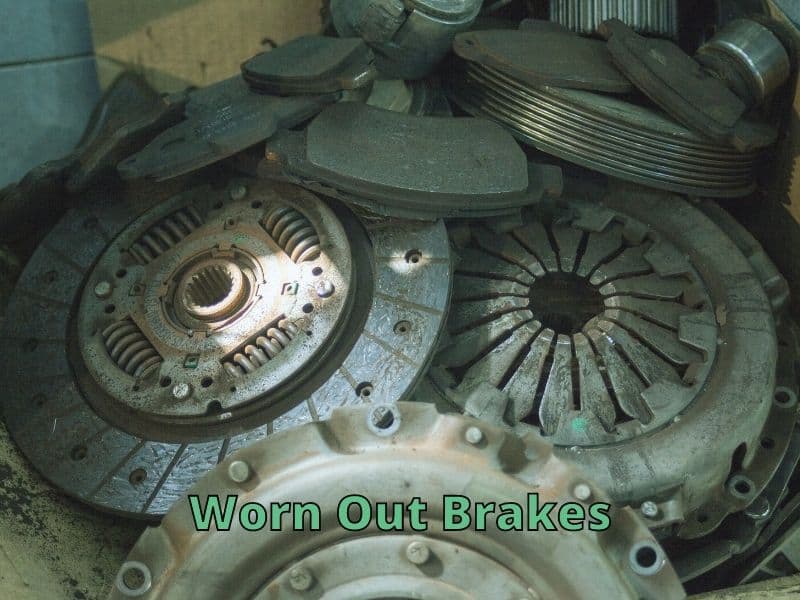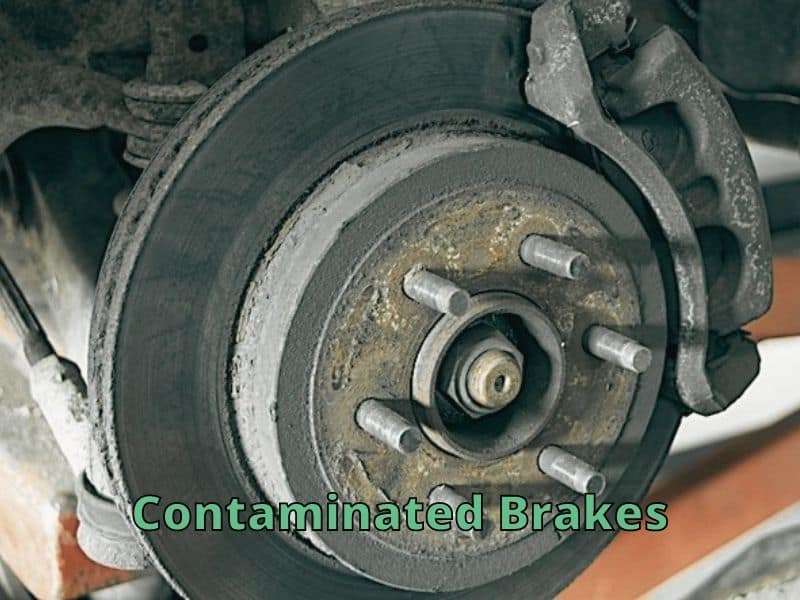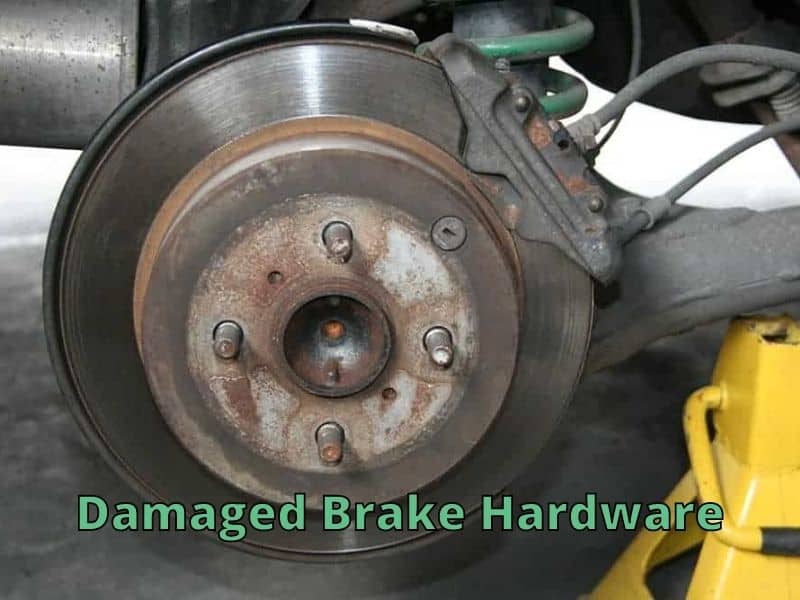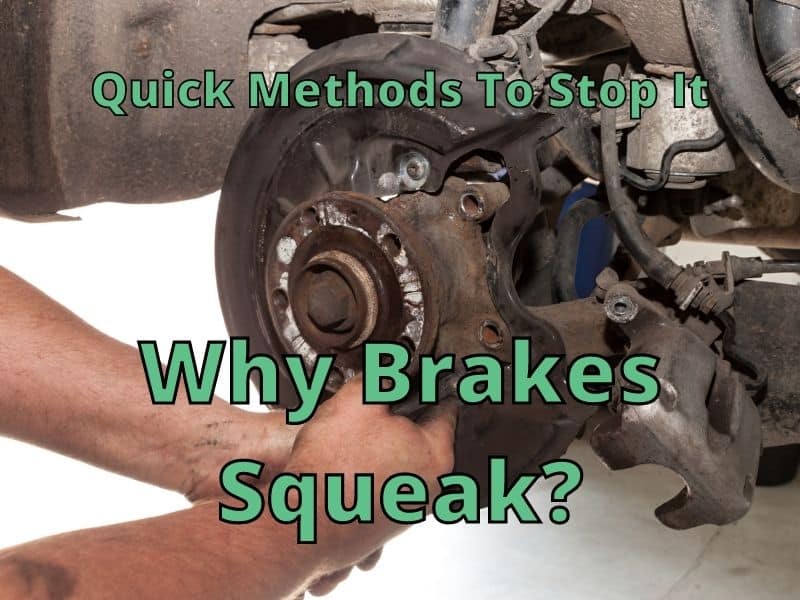Nothing is more irritating than a squeaking brake. The noise that it creates is not only annoying but can also make you worried. One of the reasons is if you get cheap pads, they will squeak. I had this same issue with my car. They told me I needed to change to ceramic brake pads to eliminate the squeak.
Brake pad friction is the most common cause of squeaking brakes. There are a few things you can do to stop these common causes right away:
- Worn out brakes
- Contaminated brakes
- Damaged brake hardware
- Lack of lubrication
Remember, a car with noisy brakes is risky to drive and has more costly repairs in the future.
Bad brakes are several causes of squeaking brakes, the most common car problem. We’ll explain what you need to know and follow the guidelines below to stop your brakes from squeaking.
Squeaky Brakes: What Causes Them? Is It Bad?
If the brake pads generate friction to slow a vehicle, they produce heat. When the disc, brake pad, and caliper come together under certain situations, it can result from squeaking sounds.
Consider the following if your brakes squeaking or grinding:
- Broken anti-rattle clips
- Lack of pad insulation
- Incorrect rotor surface cut
- Foreign objects
- Cheap brake pads
- Weather conditions
If your brakes are still squeaking, you should inspect them. It could be an indication your brake pads need to replace. Brakes should check for at least 6-12 months.
It’s not always bad but do not ignore it. A minor squeak in the brakes may not be a cause for alarm, depending on the situation. When the brakes are hot, they can squeak, but they may last for a short time.
Common Methods To Stop Squeaking Brakes
I have learned some easy ways to help stop brakes from squeaking. Some are quick, and others may take a little more time.
Before you can fix the problem, you should have an understanding of it first. Brake noise may refer to the vibration that originates from one of the brake components. The noise begins with the caliper applying pressure on the rotor when the brake is applied. Even if you have brand new brakes, this is one problem that can be apparent.
We will tackle the different possible reasons why the brake is making a squeaking noise. Once the cause of the noise is determined, it will be easier to figure out what needs next.
Ensure you take safety precautions when working on your car. This article is for informational purposes only. Contact a car service professional to get help if you need help.
Worn Out Brakes

Over time, your brakes can suffer from wear and tear. It can deteriorate, and for this reason, it is going to make a noise. The problem can originate from the brake pads, the brake rotors, or both.
QUICK METHOD:
- Turn the front wheels to the left or right while the car is on. Turn off the car.
- Then look at the brakes through the wheel hub or behind it to inspect the brake pad.
- If worn you see that it is worn down, then you know why the brake is squeaking.
LONGER METHOD:
- Take the wheel off and inspect the brake pads or brake rotors. Pay attention to the signs indicating that these parts have already worn out.
- If the problem is with the rotor, all you have to do is sand it with your choice of newspaper.
- If the parts are severely damaged, you need to have them replaced. For brake rotors, if they are already too thin, a replacement is a must.
Contaminated Brakes

You may easily detect if the brake rotor or pads by completing a short inspection of the brakes. Road salt, mud, and any contaminant can cause these problems. If the rotor has rust, it is a sign of pollution and will cause the brakes to squeak.
QUICK METHOD:
- Look at the rotors through the wheel hub or behind it to inspect the rotor for contaminants.
- If the surface has rust or other particles that shouldn’t be there, then you know why the brakes are likely squeaking. The brake pads likely are contaminated and need to be resurfaced.
LONGER METHOD:
- Remove the rotor and the brake pads.
- Sand the surface to remove the contaminants. Be sure to apply enough pressure to take off dirt and grime stuck on the surface.
- Before installing a new brake rotor, clean it using a brake cleaner. It will remove the oily film on top, potentially speeding up contamination. Using a clean towel, wipe it away.
- Brake cleaner is used only on the rotor. For the brake pads, it can cause damage that will compromise its performance.
Damaged Brake Hardware

As shown in the video above, this is something that many people ignore. The rotor and the pads are the main parts of the brake, but they are not the only ones that wear out through time. Hardware problems might also occur, which could explain why you hear a squeaking noise.
- Inspect the hardware and see if they are still in good condition.
- If it’s already damaged, remove the old hardware and replace it with a new one.
Lack Of Lubrication
Friction is another reason why your brakes are squeaking. When two components touch each other, they will create friction that can result in noise. It can also speed up the wear of the components that are in contact.
- Apply anti-seize lubricant to the contact points between the brake pads and the brake caliper. Not the pad surfaces or rotor.
- Apply silicone paste to grease the pins on the caliper
Pro Tips To Stop Brakes From Squeaking
To prevent squeaking noise and to successfully carry out the steps mentioned above, here are some of the most important things that you have to keep in mind:

- If you are removing an old rotor and replacing it with a new one, be sure to scrub the hub to remove any rust on the surface. If not, the rust can spread and can cause serious damage, in the long run, not just noise.
- As a lubricant, a dampening paste can also be effective in silencing brakes. This is going to produce a thin cushion, which will dampen the vibration, and as a result, lessen the noise. When applying the paste, be sure to provide it with plenty of time to dry out before attaching the parts that you have earlier removed.
- It will also help to keep your vehicle in the garage or in a climate-controlled environment. Moisture can collect on the brake rotors. It leads to the formation of a thin layer of rust, which is the reason for the noise. If you keep it away from rain, snow, condensation, or dew, this problem can be prevented.
- Preventive maintenance is also a must. To keep your brakes from squeaking and to fix the problem before it becomes worse, have your car serviced on a regular basis by your trusted mechanic.
Materials To Use To Stop Brakes From Squeaking:
Some of the methods above will need some materials to complete the task. Here are some things you might need:
- Sandpaper
- New brake pads or brake rotors
- Brake cleaner
- Brake hardware
- Anti-seize lubricant
- Silicone paste
Don’t forget to be safe and ask for someone who will help you out through the process!
Conclusion
Breaks can seem complicated but once you’re familiar with them, they are much easier to work with. As previously said, the first step is to identify the problem’s core cause. It will be easier for you to proceed once you discover this article.
The problem could be with the brake rotor and pads. In other cases, they have worn out, so the best thing you can do is replace them.
If you don’t feel comfortable inspecting and repairing your braking system, take it to a brake repair shop to fix it. Even though total brake failure is uncommon, prevention is better than cure. Start using it right now and get your work done!
Thank you for visiting Drivinglife.net
Reference

